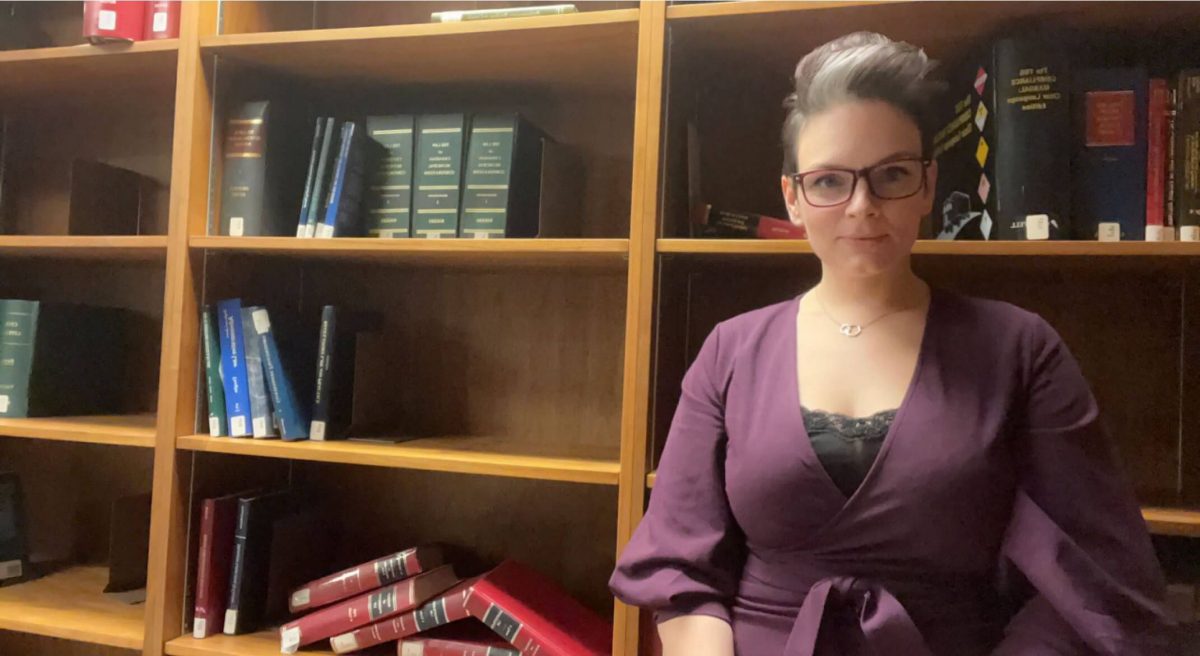
UM law student Melinda Moch
Law Makers program connects Indigenous high school and UM students
What to do after high school is a daunting decision for any young person.
The idea of post-secondary education had not even crossed high school student D’Andra (Dia) Scherban’s mind before participating in the new Law Makers program at Maples Collegiate. But their experience working with mentors from the University of Manitoba’s (UM) Faculty of Law is starting to shift that thought process to what is possible.
“Seeing the work of the law students interests me and is kind of pushing me towards that (post-secondary education),” says Scherban.
A UM partnership with the Seven Oaks School Division and Wayfinders program, Law Makers combines social justice education with mentorship, linking Indigenous UM law students with high school learners in the division. Not only does the program support students in earning a high school credit, but it also creates their first connection with post-secondary through university credit.
“[I was originally interested] because of the credit, but after being in the class, it’s really interesting learning about my own culture and how it ties to law,” says Scherban.
First-year Faculty of Law student Melinda Moch is one of the influential mentors meeting with Scherban and their classmates weekly. The goal is to show the students there are many paths after high school that can make a difference in their communities.
The program helps students to see themselves in their mentors and feel supported to take that next step to post-secondary, whether in law or not. “To me, it does not matter what course they pursue; no matter what they do, they are going to be stronger, more vocal advocates for Indigenous rights,” says Moch.
As a member of the Métis Nation, Moch learned a love of the land from her mother at a young age and hopes to impart that knowledge to the students she mentors through land rights teachings. She already sees their understanding of and interest in the connections between the social justice teachings and the current events faced by Indigenous nations across the country.
“Seeing how the [students] are connecting aspects of the law they are learning about with real-world examples and asking such smart questions is so inspiring,” Moch remarks, noting she is as inspired by the students as they are by their mentors.
Though it’s only the first year of the program, students are already showing strong interest in social justice, which Moch is confident will lead them to success in whatever they pursue.
“I foresee some of these students going many distances, [especially] the way their minds are open to the idea of anything and that, to me, is a huge prospect as well – that they, through Law Makers, will get the idea that they can become anything.” Moch has already confirmed she is planning to participate as a mentor again next year, and for as long as the program exists.
The expansion of this program to involve more participants and branch out into different fields will now be much more possible, thanks to UM’s new partnership with the Mastercard Foundation’s EleV program, which includes $16.1 million to support this work.
“The timing of this partnership and the generosity of the Mastercard Foundation are going to have such a big impact…It allows the program to happen in a bigger, better, faster way, especially in getting all the resources and people in place,” says Christine Cyr, associate vice-president Indigenous – students, community and cultural integration at UM. “We’re all grateful for this partnership.”
With Law Makers in its early stages, plans for future educational opportunities for Indigenous high school students are already underway. Cyr’s long-term goal is to connect more and more students with Indigenous mentors who will empower them to feel comfortable to work toward any dream.
“I hope to see the Law Makers program as the first step – and many more programs like it in many different fields – so every student feels supported to pursue whatever career they want,” says Cyr, adding this is only the beginning of the program’s work to create pathways to education and ensure students know their communities are rooting for them.






